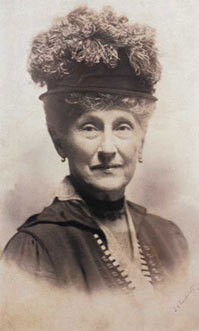Elizabeth Milbank Anderson
American philanthropist and public health advocate
Elizabeth Milbank Anderson (December 20, 1850 – February 22, 1921) was a prominent American philanthropist and advocate for public health. She is best known for her contributions to the establishment of the Milbank Memorial Fund, a major influence in the development of public health policy in the United States.
Early Life and Education[edit | edit source]
Elizabeth Milbank was born in New York City to Jeremiah Milbank, a successful businessman and philanthropist, and Elizabeth Lake. She grew up in a family that valued social responsibility and charitable work. Elizabeth was educated privately, receiving a broad education that included the arts and sciences, which was uncommon for women of her time.
Philanthropic Work[edit | edit source]
Elizabeth Milbank Anderson's philanthropic efforts were diverse, focusing on health, education, and social welfare. She was particularly interested in improving public health and living conditions for the poor.
Public Health Initiatives[edit | edit source]
In 1905, Anderson founded the Milbank Memorial Fund, which aimed to improve public health through research and policy development. The fund supported various initiatives, including the establishment of public health departments and the promotion of health education.
Anderson also funded the construction of public baths in New York City, providing much-needed sanitation facilities to underserved communities. These baths were part of a broader movement to improve urban living conditions and reduce the spread of disease.
Support for Education[edit | edit source]
Elizabeth was a significant benefactor of Barnard College, a women's college affiliated with Columbia University. Her contributions helped to expand the college's facilities and programs, ensuring that women had access to higher education.
Milbank Hall, one of the main buildings on the Barnard campus, was named in her honor, reflecting her commitment to women's education.
Legacy[edit | edit source]
Elizabeth Milbank Anderson's legacy is evident in the continued work of the Milbank Memorial Fund, which remains a leading organization in public health research and policy. Her contributions to public health and education have had a lasting impact, influencing generations of health professionals and educators.
Related Pages[edit | edit source]
Search WikiMD
Ad.Tired of being Overweight? Try W8MD's physician weight loss program.
Semaglutide (Ozempic / Wegovy and Tirzepatide (Mounjaro / Zepbound) available.
Advertise on WikiMD
|
WikiMD's Wellness Encyclopedia |
| Let Food Be Thy Medicine Medicine Thy Food - Hippocrates |
Translate this page: - East Asian
中文,
日本,
한국어,
South Asian
हिन्दी,
தமிழ்,
తెలుగు,
Urdu,
ಕನ್ನಡ,
Southeast Asian
Indonesian,
Vietnamese,
Thai,
မြန်မာဘာသာ,
বাংলা
European
español,
Deutsch,
français,
Greek,
português do Brasil,
polski,
română,
русский,
Nederlands,
norsk,
svenska,
suomi,
Italian
Middle Eastern & African
عربى,
Turkish,
Persian,
Hebrew,
Afrikaans,
isiZulu,
Kiswahili,
Other
Bulgarian,
Hungarian,
Czech,
Swedish,
മലയാളം,
मराठी,
ਪੰਜਾਬੀ,
ગુજરાતી,
Portuguese,
Ukrainian
Medical Disclaimer: WikiMD is not a substitute for professional medical advice. The information on WikiMD is provided as an information resource only, may be incorrect, outdated or misleading, and is not to be used or relied on for any diagnostic or treatment purposes. Please consult your health care provider before making any healthcare decisions or for guidance about a specific medical condition. WikiMD expressly disclaims responsibility, and shall have no liability, for any damages, loss, injury, or liability whatsoever suffered as a result of your reliance on the information contained in this site. By visiting this site you agree to the foregoing terms and conditions, which may from time to time be changed or supplemented by WikiMD. If you do not agree to the foregoing terms and conditions, you should not enter or use this site. See full disclaimer.
Credits:Most images are courtesy of Wikimedia commons, and templates, categories Wikipedia, licensed under CC BY SA or similar.
Contributors: Prab R. Tumpati, MD





